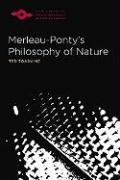Read more
Informationen zum Autor TED TOADVINE is an assistant professor of philosophy and environmental studies at the University of Oregon. He is managing editor of the journal Environmental Philosophy , and serves as secretary of the International Association for Environmental Philosophy. His most recent collection, The Merleau-Ponty Reader (coedited with Leonard Lawlor), is also available from Northwestern. Klappentext The book examines key moments in the development of Merleau-Ponty's philosophy of nature while roughly following the historical sequence of his major works. Toadvine begins by setting out an ontology of nature proposed in Merleau-Ponty's first book, The Structure of Behavior. He takes up the theme of the expressive role of reflection in Phenomenology of Perception, as it negotiates the area between nature's own "self-unfolding" and human subjectivity. Merleau-Ponty's notion of "intertwining" and his account of space provide a transition to Toadvine's study of the philosopher's later work--in which the concept of "chiasm," the crossing or intertwining of sense and the sensible, forms the key to Merleau-Ponty's mature ontology--and ultimately to the relationship between humans and nature. Zusammenfassung Examines key moments in the development of Merleau-Ponty's philosophy of nature while roughly following the historical sequence of his major works. This book discusses the role of reflection in Phenomenology of Perception! as it negotiates the area between nature's own 'self-unfolding' and human subjectivity. Inhaltsverzeichnis List of Acknowledgments; Abbreviations; Introduction: Renewing the Philosophy of Nature; 1. Nature as Gestalt and Melody; The Structures of Behavior; Physical! Vital! and Mental Gestalts; The Problem of Perception; The Historicity of Consciousness; 2. Radical Reflection and the Resistance of Things; Perceptual dialogue and the "Natural Self"; Radical Reflection and Phenomenology; The Nature of Reflection; 3. Animality; Ontological Exceptionalism in Phenomenology; Human-Animal Intertwining; 4. The Space of Intentionality and the Orientation of Being; 5. The Human-Nature Chiasm; The Chiasm of Sentient and Sensible; Ontological Diplopia and the Phenomenological Reduction; The Duplicity of the Thing; Good Error and the Expression of Nature. ...

